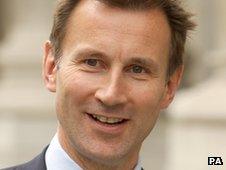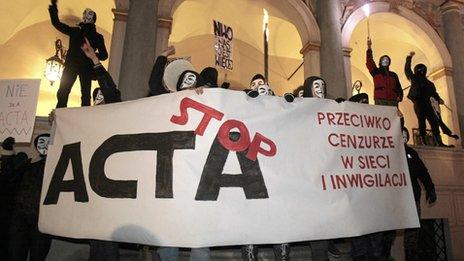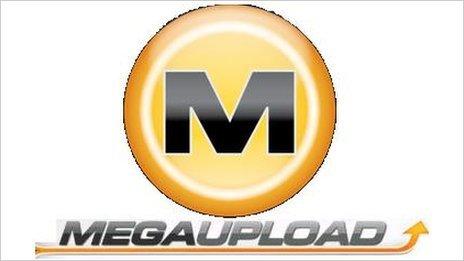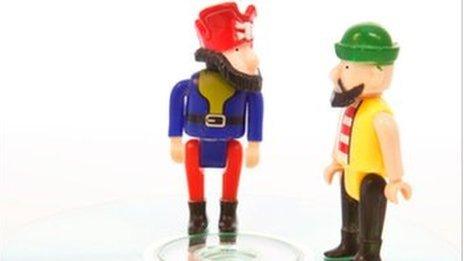Anti-piracy download laws around the world explained
- Published

Millions of users of one of the internet's largest file-sharing sites, Megaupload, face losing their data today (2 February) according to US officials.
They site was shut down two weeks ago and its founder Kim Dotcom arrested.
Federal prosecutors have accused it of costing copyright holders more than $500m (£320m) in lost revenue. The firm says it responded to complaints about pirated material quickly.
The site's founders have been charged with violating piracy laws.
Find out what anti-piracy legislation is in place in different countries around the world.
The United States of America
New laws are being proposed in America that would mean anyone found guilty of streaming copyrighted content without permission 10 or more times within six months could face up to five years in jail.
The US government and copyright holders would have the right to ask for court orders against any site accused of "enabling or facilitating" piracy.
US-based internet service providers, payment processors and advertisers would be outlawed from doing business with alleged copyright infringers.
The bills would also outlaw sites from containing information about how to access blocked sites.
The United Kingdom
The Digital Economy Act 2010 was rushed through parliament at the end of the Labour administration.

Culture Secretary Jeremy Hunt has been targeting illegal downloaders
It has since been changed a number of times, but its main provision remains a letter-writing campaign targeting people identified as illegal downloaders.
The letters - which would start being sent out in 2013 - would offer advice on how to stop illegal activity, but would not make demands for money or threaten disconnection.
The act has been challenged in the courts by Internet Service Providers (ISPs) including TalkTalk and BT, who argue it unfairly makes them police users' behaviour.
France
In France, illegal downloaders are sent a warning email, then a letter if they continue and finally have to appear before a judge if they offend again.
The judge can impose a fine, or suspend their access to the internet.
The creation and internet bill set up a new state agency - the higher authority for the distribution of works and the protection of copyright on the internet (Hadopi) - which is an anti-piracy unit that monitors peer-to-peer networks.
The law, passed in 2010, was backed by President Nicolas Sarkozy and the entertainment industry.
Italy
Italian politicians are proposing two new bits of legislation that would change the country's copyright legislation.
Internet service providers would have to disconnect subscribers after getting a single notice, as opposed to the three strike rule in France.
Other "interested parties" could file complaints and ISPs would also have to keep a list of all copyright offenders to make sure they didn't reoffend.
The proposed legislation would also require internet service providers to change content deemed to be breaking copyright laws.
Spain
Under the country's new Sinde Law, copyright holders can report websites hosting illegal content to a newly created government commission.
The intellectual property commission will decide whether it wants to take action against a site breaking the law or the ISPs hosting it, and the case will then be passed to a judge to rule on whether the site should be shut down.
The aim is to complete the process within 10 days.
Opposition has been strong in Spain, with bloggers, journalists and tech professionals staging a series of protests, including writing an anti-Sinde manifesto.
New Zealand
New Zealand has a similar system to France, where the three strike system exists.
The country's copyright infringing file sharing act was officially passed in September 2011.
Anyone caught sharing copyrighted material on the web receives a warning letter via their ISP.
After getting a third notice, copyright holders can take offenders to the country's copyright tribunal where people can face fines of up to $15,000 (£7,800) and disconnection.
Anti-Counterfeiting Trade Agreement (Acta)
While mentioning what different countries have in place, or a proposing to put in place, this worldwide agreement should not be ignored.
22 EU member states, including the UK, signed the agreement in January and it could be ratified by the European Parliament later this year.

The EU, Mexico and Switzerland say they will sign up to Acta soon
Only Germany, the Netherlands, Estonia, Cyprus and Slovakia did not sign up.
The US, Australia, Canada, Japan, Morocco, New Zealand, Singapore and South Korea are also part of Acta.
It proposes to improve "the enforcement of intellectual property rights" in participating countries.
It suggests setting international standards over how copyright infringements are dealt with, with preventative measures including possible imprisonment and fines.
The UK's Intellectual Property Office, external has backed the measures with the agreement also targeting the trade in counterfeited physical goods.
But there have been protests against the agreement around the world, with the most vocal taking place in Poland.
A demonstration is due to take place in Dublin on Saturday (4 February) with another one planned in London's Trafalgar Square on Saturday 11 February.
- Published2 February 2012
- Published8 March 2012

- Published23 January 2012

- Published8 March 2012

- Published20 January 2012

- Published8 March 2012

- Published21 October 2011

- Published6 October 2011
